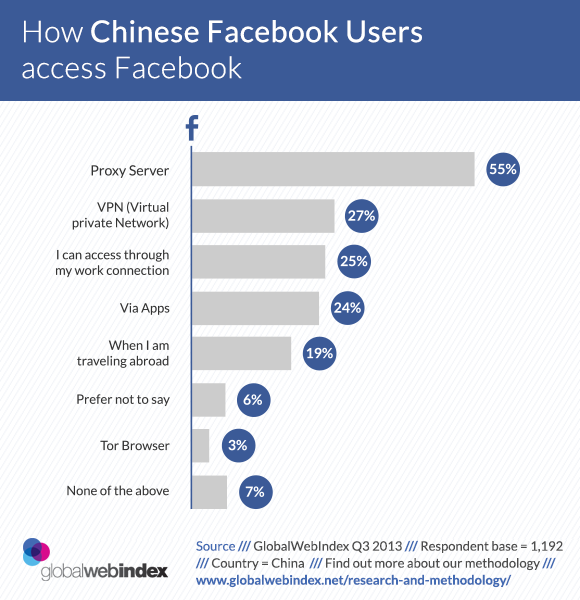Since launching GlobalWebIndex in 2009, we’ve been tracking the growing usage of banned US social platforms in China. Facebook usage has always been of particular interest, and the percentage of Chinese internet users actively using Facebook has, in fact, grown substantially from 3% in 2009 to 21% in Q2 2013.
With 52% of internet users globally (excl. China) being active Facebook users, China is still way behind other markets in terms of penetration (Japan is closest at 22%), but the sheer scale of the Chinese internet means that this represents tens of millions of active Facebook users (86m by our latest estimate). Despite this, popular belief still maintains that US social media services have zero presence in the market, and even Facebook official numbers cite just 600,000 users based in China.
It is, however, time we reappraise this. The news that China is opening up access to Facebook and other banned services in a part of Shanghai shows that things are changing. In the last four years (11 waves of research), we have seen a consistent trend develop: a growing number of users significant enough to demonstrate widespread usage of Facebook, Twitter and others. Behind this claim is our Core research in which we’ve interviewed a representative sample of over 17,000 Chinese users aged 16-65 from all regions and demographics, using a wide range of research providers and sources to guarantee the most accurate dataset ever compiled on Chinese internet usage.
None of this should be a surprise. China internet is a highly tech-savvy market with world leading adoption of smartphones and the highest levels of social engagement globally combined with a claimed 300m who are learning English. In tandem, Facebook is so woven into the global fabric of the internet (OS integration, share buttons, single sign-ins, etc.), film, entertainment, sports and culture as a whole that it is logical a significant portion of the world’s largest internet market would want to take a look. To give an example, English Premier League Football (EPL) is huge in China, and Facebook and Twitter are key channels that clubs and players use to communicate and interact with their fans. This example reflects how Chinese users utilise Western social media services. According to GWI research, they are using them in a lighter and more passive way than local services like Sina Weibo. Facebook is used more for staying up to date with what’s going on in the world rather than publishing or building peer to peer communities.
Unrestricted access
But how do Chinese users access these services? In Core GWI Q3 2013, we integrated a question asking Chinese respondents how they accessed restricted social media services. While Q3 data is quite available yet, we have pre-release data (see figure 1 below) that definitively demonstrates how mainstream Proxy and VPN usage is within China. 55% of Chinese Facebook users access the social platform via a Proxy Server and 27% via a VPN. Proxy and VPN services are now so easy to find that it takes less than five minutes to get round any IP based local restrictions where ever you are in the world.
Another important channel of access is corporate networks. 25% of Chinese active Facebook users access via a office connection, a reflection of the fact that with most large companies and multinationals route their internet traffic via home markets. Thirdly, we’ve found that many third party mobile / tablet apps allows access to restricted social platforms. 24% of active Chinese Facebook users access “via apps” in a reflection of how complex the multi-platform internet has become. Facebook is so embedded into many third-party applications that it has become near impossible to restrict this on a universal basis. Lastly, 19% of these users access Facebook while travelling abroad (estimated 94m Chinese will travel abroad in 2013), proving the rapidly changing and international nature of the Chinese population.
What does this mean?
- As a digital marketer active or interested at being active in China, we should start to re-evaluate the reality of the market and look beyond local platforms for future strategy. Granted this is difficult to act on today, but the market is changing fast so early preparation is key.
- In a broader sense, this research proves that we should not be relying on analytics and passive data to generate insights, measure audience behaviour or profiling site visitors. IP address allocation by country is becoming an increasingly difficult if not impossible task and will deliver misleading results.
- With the softening of stance on Facebook access in Shanghai, it’s clear the longer term trend is to more openness. Our data demonstrates that this is happening already, and the great weight of the emerging middle class combined with the power of the internet will make the great firewall a legacy of the past.



